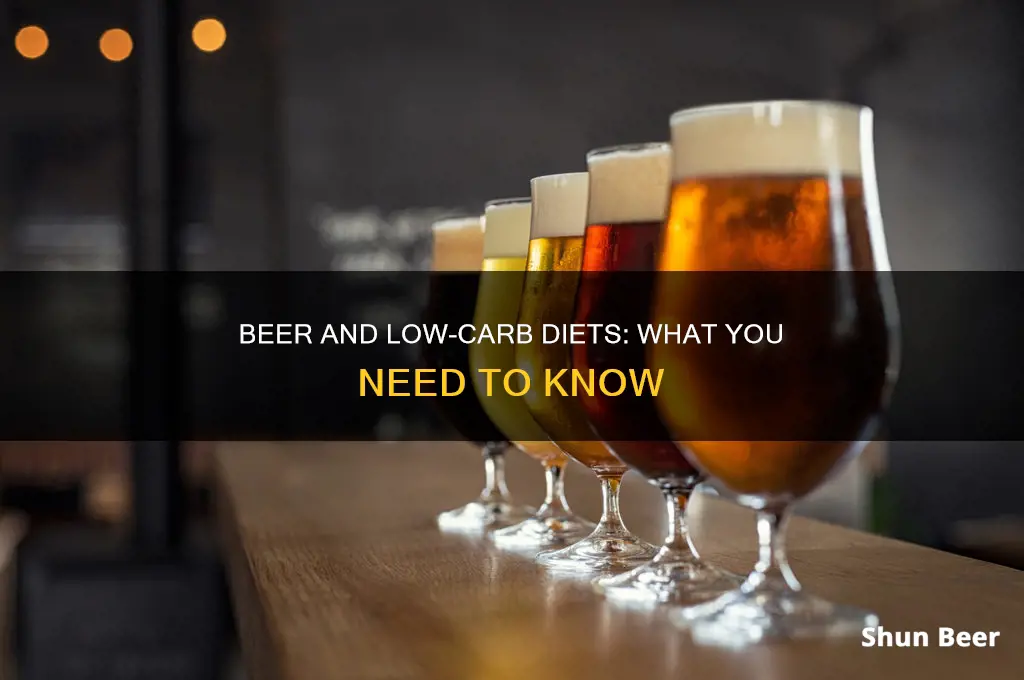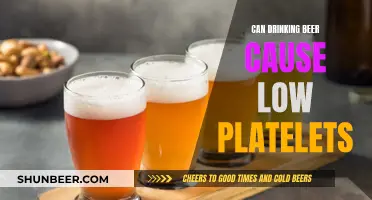
Beer is one of the highest-carb alcohol options, so it's not the best drink to have if you're on a low-carb diet. However, there are some low-carb beers available, which typically have less than 1g of carbs per 100ml. These include Bud Light, Budweiser Select 55, Corona Premier, and Beck's Premier Light.
If you're on a low-carb diet, wine and pure spirits are the lowest-carb options.
What You'll Learn

Beer is high-carb
Beer is one of the highest-carb alcohol options. It is produced from starch, which is one of its primary ingredients, and can contain 3–12 grams of carbs per 12-ounce (355-ml) serving. This amount varies depending on whether it is a light or regular beer, with regular beers containing more carbs.
Low-Carb Beers
Low-carb beers generally have less than 1g of carbs per 100ml. Some examples include:
- Amstel Light (5g of carbs per serving)
- Blue Moon LightSky (3.6g of carbs per serving)
- Budweiser Select 55 (1.9g of carbs per serving)
- Corona Premier (2.6g of carbs per serving)
- Dogfish Head Slightly Mighty (3.6g of carbs per serving)
- Beck's Premier Light (3.9g of carbs per serving)
- Omission Ultimate Light Golden Ale (3g of carbs per serving)
The Impact of Beer on Blood Sugar and Ketone Levels
An experiment conducted by Dr. Peter Foley, MBBS, MRCGP, tested the impact of drinking beer on blood sugar and ketone levels. The results showed that all beers, including those marketed as low-carb, light, or low-calorie, resulted in higher blood sugar readings compared to water. Additionally, all the beers brought blood ketone levels down to zero.
Alternatives to Beer
If you are following a low-carb diet and want to avoid the high carb content of beer, there are several alternatives you can consider:
- Wine: Relatively low in carbs, usually containing under 6 grams per serving.
- Pure forms of alcohol: Whiskey, gin, tequila, rum, and vodka are all carb-free.
- Low-carb mixers: When drinking alcohol, use low-carb mixers such as diet soda, seltzer, diet tonic water, or powdered flavor packets to keep your overall carb intake low.
Drinking Beer in Your Car: Driveway Legalities Explained
You may want to see also

Pure alcohol is carb-free
Pure alcohol is indeed carb-free. Spirits like whiskey, gin, tequila, rum, and vodka contain zero carbs and are, therefore, a better option for those on a low-carb diet than beer or cocktails.
Spirits can be drunk neat or mixed with low-carb options like diet soda, soda water, or sugar-free tonic water. However, it's important to note that while pure alcohol may be carb-free, it is not calorie-free. Most alcoholic drinks, regardless of their carb content, contain at least 100 calories per serving.
Additionally, alcohol can slow down weight loss by providing empty calories and hindering fat burning. It can also stimulate appetite and decrease inhibitions, leading to increased food intake. Therefore, even on a low-carb diet, it is crucial to consume alcohol in moderation.
For those who enjoy beer, there are some low-carb options available, typically containing fewer than 5 grams of carbs per serving. These include Budweiser Select 55, Corona Premier, Beck's Premier Light, and Omission Ultimate Light Golden Ale, among others. However, it's important to note that even these low-carb beers can cause a significant increase in blood sugar levels and hinder ketosis.
Beer Drinking: A Sleep Inducer or Myth?
You may want to see also

Beer raises blood-sugar levels
Beer is a popular alcoholic beverage, often enjoyed as a refreshing drink on a hot day or with a meal. However, it is important to be aware of its impact on blood sugar levels, especially for individuals with diabetes or those following a low-carb diet.
Beer typically has a high carbohydrate content, with starch being one of its primary ingredients. It contains 3-12 grams of carbohydrates per 12 ounces (355 milliliters) serving, depending on whether it is a light or regular variety. In comparison, a typical serving of wine contains only 3-5 grams of carbohydrates. This difference in carbohydrate content can have a significant effect on blood sugar levels.
The carbohydrates in beer are quickly absorbed by the body, leading to a rise in blood sugar levels. This is particularly concerning for individuals with diabetes, as they may already have difficulty regulating their blood sugar. Additionally, the symptoms of hypoglycemia, such as slurred speech, drowsiness, confusion, or difficulty walking, can be similar to those of intoxication, making it challenging to distinguish between the two conditions.
Furthermore, alcohol interferes with the liver's ability to release glucose into the bloodstream, which is necessary to maintain normal blood sugar levels. When an individual consumes alcohol, the liver prioritizes breaking down the alcohol instead of releasing glucose. As a result, blood sugar levels can drop quickly, putting individuals at risk of hypoglycemia. This risk is especially high for those taking insulin or certain types of diabetes medication.
It is worth noting that not all beers have the same carbohydrate content, and some low-carb options are available. Light beers, for example, tend to have lower carbohydrate content than their regular counterparts. However, it is always important to check the nutritional information and choose beers with 5 grams of carbohydrates or fewer per serving. Additionally, drinking in moderation is crucial, with one drink per day for women and two drinks per day for men considered moderate consumption.
In conclusion, while beer can be enjoyed as part of a balanced lifestyle, it is important to be mindful of its impact on blood sugar levels. Individuals with diabetes or those following a low-carb diet should be particularly aware of the effects of beer on blood sugar regulation and take appropriate measures to maintain their health.
Drinking Beer Post-Durian: Safe or Risky?
You may want to see also

Low-carb beers are available
If you're on a low-carb diet, you may be wondering if you can still enjoy a beer. The good news is that there are indeed low-carb beers available, which typically have less than 1g of carbs per 100ml. These beers can be a great option if you're following a keto diet or simply looking to cut down on your carbohydrate intake.
When choosing a low-carb beer, look for light beers as these tend to have lower carb contents than other varieties. Some popular options include:
- Amstel Light (5g of carbs per serving)
- Blue Moon LightSky (3.6g of carbs)
- Budweiser Select 55 (1.9g of carbs)
- Corona Premier (2.6g of carbs)
- Dogfish Head Slightly Mighty (3.6g of carbs)
- Lagunitas DayTime (3g of carbs)
- Michelob Ultra Pure Gold (2.5g of carbs)
- Miller Lite (3.2g of carbs)
However, it's important to keep in mind that even these low-carb beers can still impact your blood sugar and ketone levels. Additionally, alcohol can slow down weight loss and contribute to nutritional deficiencies, so it's best to consume in moderation.
So, if you're watching your carb intake, you don't have to give up beer completely. Just be mindful of your choices and remember to drink in moderation.
Mixing Robitussin and Beer: Is it Safe?
You may want to see also

Alcohol may slow weight loss
The number of calories in alcoholic drinks varies, with most containing at least 100 calories per serving. Mixed drinks and cocktails tend to be higher in calories due to added ingredients like sugar, juice, and other high-carb mixers. Beer, for example, typically has 3-12 grams of carbs per 12 ounces, depending on whether it is a light or regular variety.
To minimise the impact of alcohol on weight loss, it is recommended to consume low-carb options in moderation. Pure forms of liquor like rum, whiskey, gin, and vodka are carb-free, while light beer and wine are relatively low in carbs, with 3-4 grams per serving. It is also important to be cautious when drinking on a low-carb diet, as the effects of alcohol may be stronger.
Beer and No-Carb Diets: What You Need to Know
You may want to see also
Frequently asked questions
Beer is one of the highest-carb alcohol options. However, there are some low-carb beers available that contain around 5 grams (g) of carbs or less per serving. These include Bud Light, Budweiser Select 55, Corona Premier, and Beck's Premier Light, among others.
A typical beer has 13 grams of carbs per 12 ounces (355 milliliters). However, the carb content can vary depending on the brand and type of beer. For example, light beers tend to have lower carb content than regular beers.
Low-carb alternatives to beer include wine, champagne, and pure spirits like whiskey, gin, vodka, and rum. These beverages typically have fewer than 6 grams of carbs per serving.
Drinking beer, especially in excess, can slow down weight loss and potentially contribute to weight gain over time. Beer is also associated with higher blood sugar levels and can affect ketone levels, which may be important for those following a ketogenic diet. Additionally, alcohol can have stronger effects when consumed on a low-carb diet, leading to increased intoxication, hangovers, and other negative consequences.







